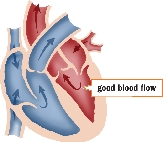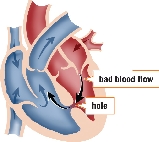Mighty Muscle
Your heart works hard. It beats around ninety times a minute. Each minute, in fact, this powerhouse pumps your body’s entire supply of blood. That’s roughly 100,000 beats a day and 2.5 billion over a lifetime. Each beat sends oxygen and disease-fighting cells throughout your body.
How does it happen? The next time you’re in a swimming pool, squeeze your hands together. Watch the water shoot up. The heart does basically the same thing. Each time it contracts, or squeezes, blood squirts through tubes called blood vessels.
Blood vessels come in three main types. Arteries carry blood away from the heart. They branch off into smaller and smaller tubes. The smallest are called capillaries. Capillaries have thin walls, so oxygen and other materials can travel from the blood and into cells where they’re needed. Veins bring “used” blood back to the heart.
Broken Hearts
Most kids have healthy hearts. Trouble usually comes years later, when parts of this pumping “machine” wear out or get clogged with fat.
But there are hearts that need help sooner. Some babies are born with heart problems. Sometimes there’s a hole that blood leaks through. At other times, parts of the heart are incorrectly formed—or missing. Like life-saving mechanics, doctors step in to tune up and repair failing hearts.
| Blood Flow in the Heart | |
|---|---|
| Average Heart | Hole in Heart |

good blood flow |

bad blood flow hole |